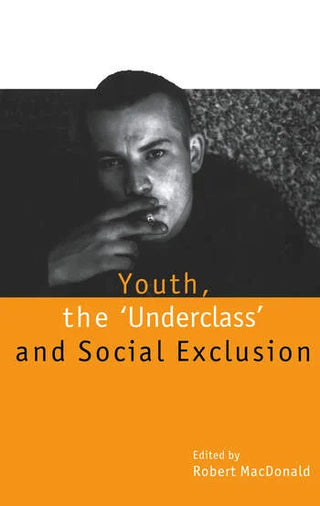Youth the Underclass and Social Exclusion
- Unit price
- / per
-
Author:MACDONALD Robert
-
ISBN:9780415158305
-
Publication Date:December 1997
-
Edition:1
-
Pages:244
-
Binding:Paperback
-
Publisher:Routledge
-
Country of Publication:United Kingdom


A Back Order button means that we don’t have the book in stock at our store. It may already be on order – or we can order it for you from a publisher or distributor at no additional cost.
As we source items from around the globe, a back-order can take anywhere from 5 days to several weeks to arrive, depending on the title.
To check how long this might take, you’re welcome to contact us and we can provide an ETA or any other information you need. We recommend checking the timeframe before committing to an online order.
Youth the Underclass and Social Exclusion
- Unit price
- / per
-
Author:MACDONALD Robert
-
ISBN:9780415158305
-
Publication Date:December 1997
-
Edition:1
-
Pages:244
-
Binding:Paperback
-
Publisher:Routledge
-
Country of Publication:United Kingdom
Description
Adding product to your cart
You may also like
A Back Order button means that we don’t have the book in stock at our store. It may already be on order – or we can order it for you from a publisher or distributor at no additional cost.
As we source items from around the globe, a back-order can take anywhere from 5 days to several weeks to arrive, depending on the title.
To check how long this might take, you’re welcome to contact us and we can provide an ETA or any other information you need. We recommend checking the timeframe before committing to an online order.
You may also like
You may also like
-
The idea that Britain, the US and other western societies are witnessing the rise of an underclass of people at the bottom of the social heap, structurally and culturally distinct from traditional patterns of "decent" working-class life, has become increasingly popular in the 1990s. Anti-work, anti-social, and welfare dependent cultures are said to typify this new "dangerous class" and "dangerous youth" are taken as the prime subjects of underclass theories. Debates about the family and single-parenthood, about crime and about unemployment and welfare reforms have all become embroiled in underclass theories which, whilst highly controversial, have had remarkable influence on the politics and policies of governments in Britain and the US. This text addresses the underclass idea in relation to contemporary youth. It focuses upon unemployment, training, the labour market, crime, homelessness, and parenting. It should be of interest to students of social policy, sociology and criminology.
-
-
Author: MACDONALD RobertISBN: 9780415158305Publication Date: December 1997Edition: 1Pages: 244Binding: PaperbackPublisher: RoutledgeCountry of Publication: United Kingdom
The idea that Britain, the US and other western societies are witnessing the rise of an underclass of people at the bottom of the social heap, structurally and culturally distinct from traditional patterns of "decent" working-class life, has become increasingly popular in the 1990s. Anti-work, anti-social, and welfare dependent cultures are said to typify this new "dangerous class" and "dangerous youth" are taken as the prime subjects of underclass theories. Debates about the family and single-parenthood, about crime and about unemployment and welfare reforms have all become embroiled in underclass theories which, whilst highly controversial, have had remarkable influence on the politics and policies of governments in Britain and the US. This text addresses the underclass idea in relation to contemporary youth. It focuses upon unemployment, training, the labour market, crime, homelessness, and parenting. It should be of interest to students of social policy, sociology and criminology.-
Author: MACDONALD RobertISBN: 9780415158305Publication Date: December 1997Edition: 1Pages: 244Binding: PaperbackPublisher: RoutledgeCountry of Publication: United Kingdom
-



